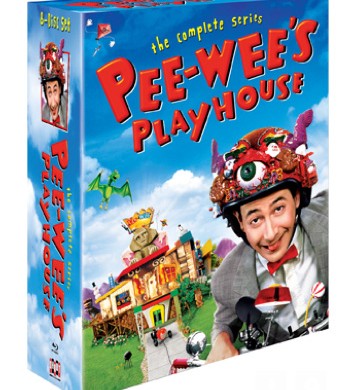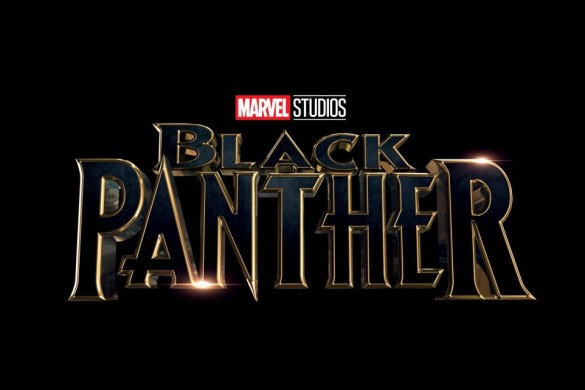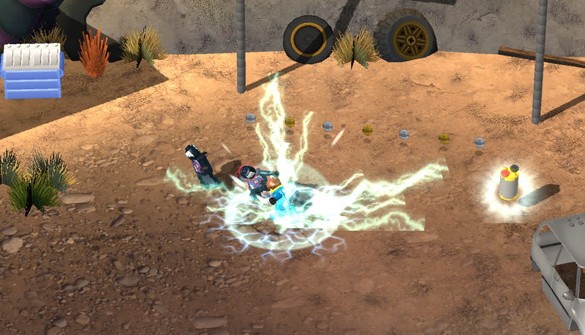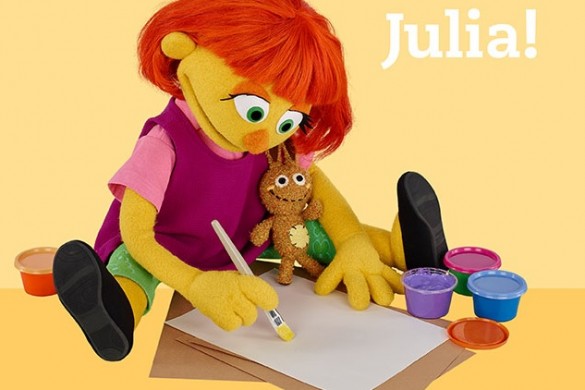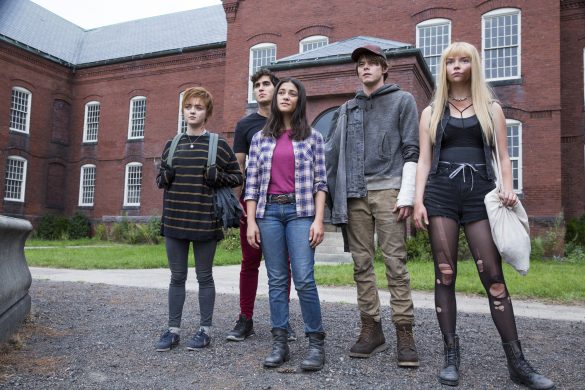Selma is in theaters on December 25 and is rated PG-13
Selma is an exceptional biopic account of Dr. King’s struggle to change a momentous time in history! As an African American child growing up in the ’70s, I am fully aware of Dr. Martin Luther King Jr’s rich legacy. My family is originally from the South, and participated in the Civil Rights Movement. I heard first-hand accounts of Dr. King’s efforts to get the 1965 Voting Rights Act passed, along with stories of family members and friends beaten and killed during America’s riddled past. Such knowledge as a child further encouraged me to earn a minor in African American history. As we all know, the South especially Alabama, was a hotbed during the Civil Rights Movement. It’s here where Dr. King encountered one of the most ruthless and racist elected officials – Governor George Wallace. Thanks to the film Selma, we are afforded the opportunity to connect to Dr. King on an intimate level, as well as, meet the diverse frontline soldiers and antagonists.
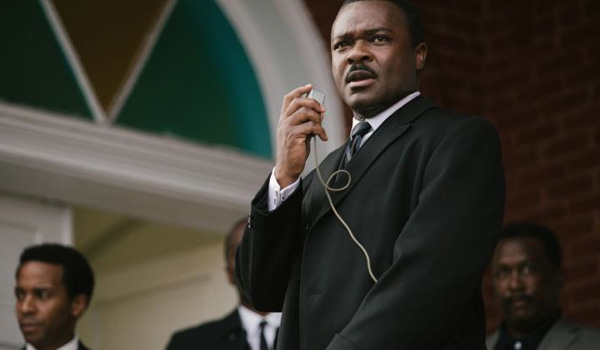
David Oyelowo plays Dr. Martin Luther King, Jr. in SELMA, from Paramount Pictures, Pathé, and Harpo Films.
Selma is written by Paul Webb, directed by Ava DuVernay and features an award-winning cast: David Oyelowo, Carmen Ejogo, Tim Roth, Wendell Pierce, Cuba Gooding, Jr., Tom Wilkinson, Lorraine Toussaint, Martin Sheen, and Oprah Winfrey opens Christmas Day courtesy of Paramount Pictures (Viacom, Inc.). Considering the unfortunate events and protests now happening in our country, the release of this subject matter is timely. Selma is more than a cinematic dissertation: it’s impactful, delving deeply into America’s dark past. This film offers terrific moments in history, and includes tremendous backroom politicking scenes.
Director Ava DuVernay and writer Paul Webb reveal the story “through the eyes of Dr. King,” as he struggles to organize the three Selma-to-Montgomery marches, which eventually led to the 1965 Voting Rights Act. David Oyelowo lends a gripping performance passionately portraying the many facets of the honorable icon, Dr. King. For the first time ever, we see Dr. King as a real man fueled by faults, doubt, fear, weariness and shame. Yes, snippets of amazing speeches are delivered, but DuVernay captures behind-the-scene moments when Dr. King stumbles as he writes and re-writes speeches. We see those times when Dr. King doubts himself, while conversing with Andrew Young (Andre Holland) and Hosea Williams (played by the dynamic Wendell Pierce). The activists and confidants remind Dr. King that Selma is the perfect grounds for a movement to occur.
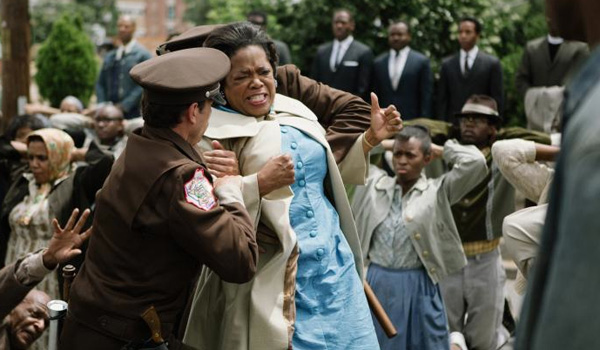
Oprah Winfrey (center) plays Annie Lee Cooper in SELMA, from Paramount Pictures, Pathé, and Harpo Films.
Carmen Ejogo is a scene stealer as Coretta Scott King, a role delivers faultlessly. We see both strength and vulnerability, including a pivotal scene where she speaks with former militant Civil Rights leader, Malcolm X (Nigel Thatch), who offers to play the pawn in order to help Dr. King. This meeting with Coretta and Malcolm X momentarily angered Dr. King, who was imprisoned for leading demonstrations. By the way, after the death of both slain Civil Rights leaders, their widows (Coretta Scott King and Dr. Betty Shabazz) became best friends working tirelessly on Civil Rights issues.
Tim Roth plays an intensely ruthless, despicable and vile Governor George Wallace. He’s a great reminder of the bigotry and hate many possess. With Tim Wilkinson as a stern and adamant President Lyndon B. Johnson and Dylan Baker as the abhorrently repulsive J. Edgar Hoover, we uncovered another side of the 1960s White House. President Johnson wanted to put the “voting rights act” on the back burner in order to focus on eradicating poverty first. We learn that the Civil Rights issue wasn’t a serious problem for President Johnson until it became front page news. Once TV cameras depicted severe beatings and senseless killings, President Johnson felt compelled to do something. So, he sent J. Edgar Hoover down South to stir up trouble. The King family started receiving countless threatening phone calls, while Dr. King received assassination threats.
In Selma, DuVernay does an impeccable job highlighting the bravery of other activists who assisted Dr. King in his Civil Rights efforts. This inspirational film shows who, along with Dr. King were “drum majors for justice.” Oscar winner and producer on the project, Oprah Winfrey, was remarkable as activist Annie Lee Cooper. Renowned actress Lorraine Toussaint was flawless as Amelia Boynton, while Stephan Jones was memorable as future Senator John Lewis. Some of the best scenes are the ones where Dr. King’s soldiers are fighting for justice – soldiers of all diverse backgrounds. In the end, we see a front line of varied faces, marching from Selma-to-Montgomery.
In light of recent events around the country: it’s doubly important that both young and old watch Selma and grasp its purposeful message. We are doomed to repeat our past if we don’t learn from our history. Sadly, this summer Congress approved nearly unanimously (521-33) to dismantle the Voting Rights Act. Based upon a 2013 Supreme Court decision and reauthorized legislation made in 2006, this major act has been stripped of key enforcement provisions that would help voter turnout. Hopefully, Congress will get around to fixing this piece of legislation before it becomes too much one-sided as in the past. Unfortunately, Selma didn’t have this news development to add to its postscript. Would have been good food for fodder… Selma is an empowering film chronicling the triumphantly turbulent march to freedom many Americans took with Dr. Martin Luther King Jr.
For more information:
Facebook: www.facebook.com/SelmaMovie
www.selmamovie.com: Official site for the movie
www.nps.gov/nr/travel/civilrights/al4/htm: for information on the Selma-to-Montgomery March
t will have a limited release in the United States on Christmas Day 2014 and will open wide January 9, 2015
* We attended screening for editorial purposes. Our opinions are solely our own.
Lead photo: Left to right: Tessa Thompson plays Diane Nash, Corey Reynolds plays Rev. C.T. Vivian, David Oyelowo plays Dr. Martin Luther King, Jr. and Colman Domingo plays Ralph Abernathy in SELMA, from Paramount Pictures, Pathé, and Harpo


